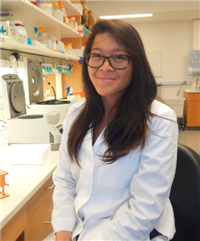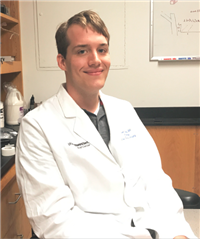Student Profiles
Thuy Nguyen

In college, I discovered that I loved learning through the process of scientific research. I was fascinated by the complexity of biological interactions that take place at the molecular and cellular levels, and I wanted to continue to understand them throughout my graduate studies (or something like that). When coming to UTSW, I felt drawn to quantitative methods that make sense of such complexity.
Contacts of protein-protein interactions are a well-known location of co-evolution and epistasis. Interactions between proteins can be inferred from statistical analysis of protein sequences across many species. Such an analysis reveals that a pair of proteins that are not known to physically interact, dihydrofolate reductase and thymidylate synthase, are co-evolving. Using this model system, I am addressing two central questions: What is the general location of co-evolution across proteins, beyond physical interfaces? And do these interactions inferred from the statistics of evolution resemble experimental measurements?
A perk of the Molecular Biophysics Graduate Program, and UTSW in general, are the faculty. They are approachable human beings, rigorous scientists, and highly committed to mentoring their trainees.
Thuy Nguyen
Computational Biology
Mentor: Kimberly Reynolds, Ph.D.
Hometown: Dallas, Texas
Devin O’Kelly

Both of my parents are scientists, though neither are biologists, and so I was exposed to science at a very young age. This carried through my education and into my undergraduate engineering classes. I became interested in research when it became apparent that my real interests were in discovering new things, and putting those results together in new and different ways to benefit humanity. Medicine and biology are very active frontiers of research, and provide a huge number of opportunities to discover and develop.
UT Southwestern brings together clinicians and basic science research in a very dynamic and diverse environment, and the availability of state-of-the-art facilities ranging from sequencing cores to an on-site cyclotron to a high-performance computing center provide a particularly fertile ground for razor-edge research to take place. The thing that really sealed the deal was the graduate school’s administration; it was clear from the first encounter that the faculty and staff were (and are) very interested in fostering the next generation of great scientists. That, and the free coffee.
I use multispectral optoacoustic tomography (MSOT), a technology which is best summarized as ‘laser-powered ultrasound,’ to image and validate models of tumor vasculature, as well as developing methods to use that imaging data to infer cancer behavior and physiological state. By more richly characterizing the metabolic properties of tumors over time, and doing so non-invasively, we can better understand the effects of novel therapeutics on cancer biology, as well as enabling early detection of a wide variety of disorders. In particular, I am currently applying these methods to better understand the changes in renal tumor microenvironment induced by inhibition of the hypoxia-inducible factor (HIF) pathway.
The Computational Biology Track is extremely growth-oriented, and is frequently re-adjusting to fit to the changing needs of its student population. The close contact between computer scientists, biologists, and engineers; as well as physicians and commercialization specialists, gives extreme diversity to the viewpoints and interests of the students and faculty, which in turn leads to rather vigorous scientific discussion. The plethora of facilities and resources available give a huge amount of flexibility in pursuing research interests, and the expertise and openness of the faculty provide an ideal environment for engaging in successful research.
Devin O’Kelly
Computational Biology
Mentor: Ralph Mason, Ph.D.
Hometown: Austin, Texas
